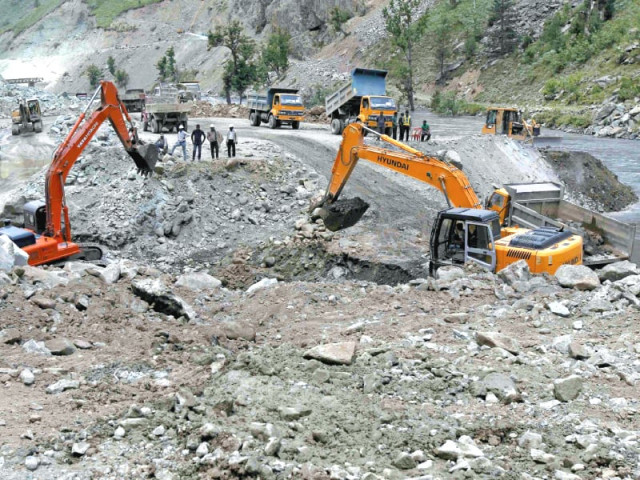Permanent Court of Arbitration: Kishanganga ruling seen ‘in Pakistan’s favour’
PM’s adviser on water resources says decision is a significant step.

Excavators dig up earth at the site of Kishanganga power project north of Srinagar. PHOTO: FILE
Pakistan on Friday said the Permanent Court of Arbitration (PCA) had ruled overwhelmingly in its favour over India’s controversial Kishanganga hydroelectric project (KHEP).
Talking to reporters here at the foreign office, Adviser to the Prime Minister on Water and Agriculture Resources Kamal Majeedullah said PCA’s decision favoured Pakistan on three out of four points, namely the restriction on India to maintain the minimum flow of the Kishanganga/Neelum River, environmental protection and the diversion of water.
Majeedullah’s statement was aimed at dispelling the impression that Islamabad had failed to justify its claims before the court of arbitration.
The Hague-based PAC, in its partial award announced on February 18, maintained that KHEP constituted a ‘run-of-river’ plant under the 1960 Indus Water Treaty (IWT) and allowed India to divert water from the Kishanganga/Neelum River according to the manner envisaged in the agreement. When operating the plant, India would be under obligation to maintain a minimum flow of water from the river, the rate of which will be determined by PCA in its final award which will be announced later this year.
Excluding unforeseen emergencies, the IWT does not permit India to reduce the water level in run-of-river plants on rivers allocated to Pakistan under the treaty below the ‘dead storage level’. This ruling does not apply to plants whose designs had not been objected to by Pakistan.
Majeedullah termed the PCA decision a significant step towards protecting Pakistan’s rights under the IWT. He said India had been using the decision of the World Bank (WB) on the Baglihar dam as a precedent for around 150 planned run-of-river plants on the western rivers, 47 of which had a power generation capacity above 50MW.
“Such designs were harmful for Pakistan’s rights under IWT,” he maintained, adding that Pakistan would also discard WB’s decision in the Baglihar case.
The adviser also revealed that during the proceedings, India raised the question of sovereignty over Jammu and Kashmir, claiming Pakistan had no right to invoke the treaty to justify any adverse impact on the Neelum-Jhelum Hydroelectric Plant as the project was not situated in the country. In response, Pakistan argued that the treaty was specifically crafted to circumvent territorial dispute over Jammu and Kashmir, he added.
Published in The Express Tribune, March 16th, 2013.



















COMMENTS
Comments are moderated and generally will be posted if they are on-topic and not abusive.
For more information, please see our Comments FAQ